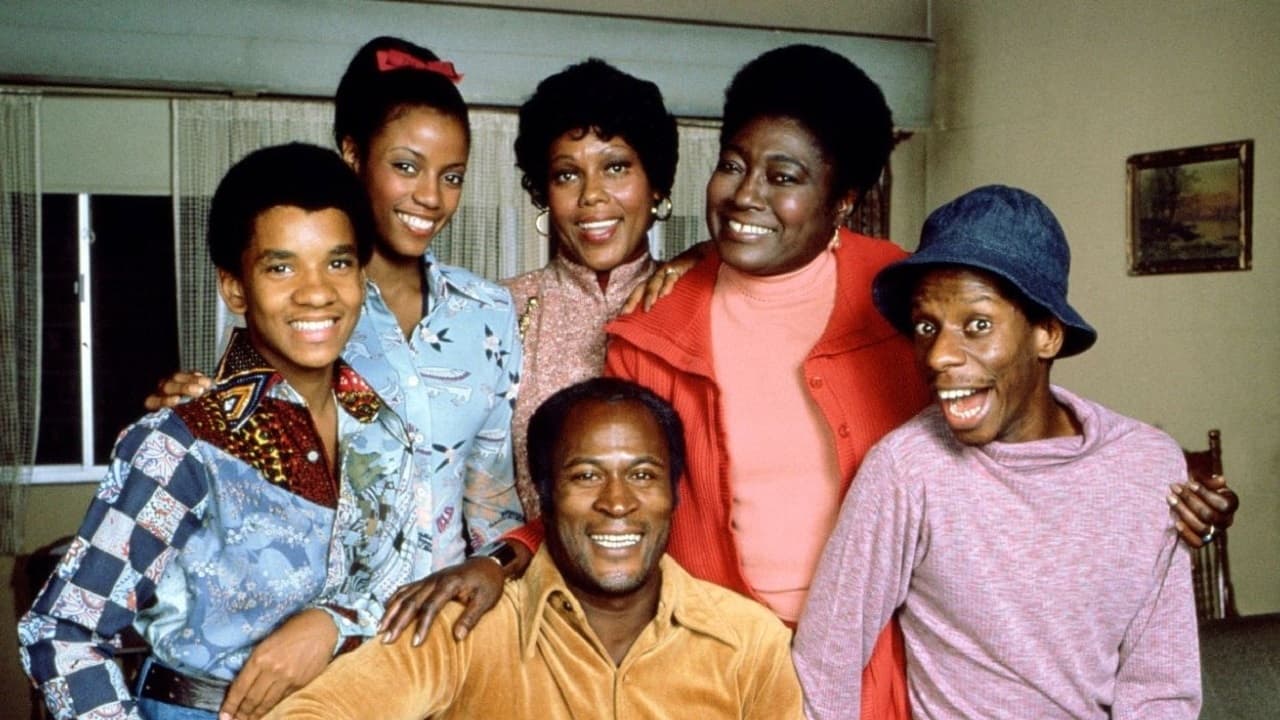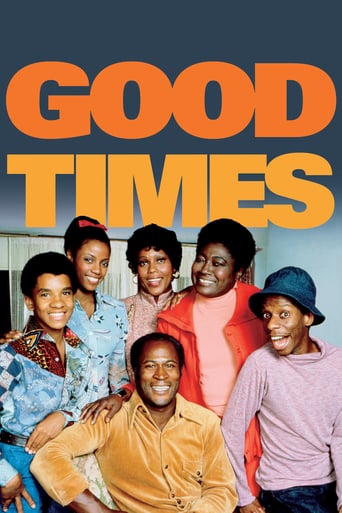

Had to write a review because I just realized an injustice done by the writers, promoting a misconception about an intact family. Just watched the episode in which the Evans family was having a farewell party in preparation to relocate to Mississippi to be with the family patriarch, James Evans, Sr. James found a good paying, steady job, in Mississippi; there was a real chance for his family to move out of poverty. The matriarch, Florida, was reading telegrams from friends wishing them well on their new move; that last one she read informed her that James was killed in an auto accident. Having seen the reruns of this show multiple times, I am familiar with the financial struggles the family faced after the loss of James. My only question is WHY? James was portrayed as a working man and he served in the Korean War. In addition he had a new job, which should have come with life insurance, especially in the 70's when most jobs came with benefits. Why weren't FL and his minor children, Thelma and Michael, eligible for Social Security? During the time when this show was broadcast children under the age of 21 were eligible for Social Security if they continued with secondary education, which Thelma and Micheal did. In addition, because the character Florida was not a skilled laborer, or a woman with a college education, her earning potential would have been limited. Therefore, she would have been eligible for widow's benefits to supplement her earnings. It's very sad that the show's writers did not choose the high road to portray the family's circumstances accurately and show that James' labor had provided for his family after his loss. The family still would have struggled and needed help but the struggle would have been mitigated.
... View MoreA great concept gone completely bad. One of Norman Lear's many spin offs, from a spin off, of another spin off of All In The Family... and even though this, like all of Lear's other shows, had a blatant political agenda, this show had a great potential. But it failed to deliver it. When it first aired it seemed promising... despite the reverse discrimination and broad sweeping hatred of all whites by the youngest son Michael, who they called the militant midget.But as time passed, it became a mockery of itself. The crown jewel of catch phrase based comedies. The first step down was killing off John Amos. The second step down was when Esther Rolle left because she felt the show negatively reflected on black youth by how it portrayed JJ Evans as a womanizing self absorbed goof. Then the final blow, after the 2 stabilizing figures left the show, was the addition of the character Penny, horribly played by the young Janet Jackson and the sudden focus on family friend and relentless insult comic, Willona.Even before then, the script writers had degraded to a formula: write an entire script around JJ's many catch phrases. Without fail, there was always the expected phone call for him to answer and say "Chello!" A compliment for him to respond to with "What can I say?!" or "I Knooooow". Always followed by an extended laugh track.To add a large anvil to the sinking ship was the addition of Bookman. Someone thought it would be funny to add a fat man to the show for Willona and the rest of the cast to insult. If you watch the pulse of the show, it became a series of insults every few seconds, met by a overwhelming laugh from the "audience". Worst yet, this fat man would do really poor imitations of real celebrities. Particularly, John Wayne. Also met by an abundance of canned laughter.It's no wonder Esther Rolle left and wanted to have nothing to do with the show. The main character had become a douche that had to get a laugh every few seconds with a worn out catch phrase. The replacement character Willona was basically an insult comic, peppering lame insults between JJ's catch phrases. And Penny was the final nail in the coffin with some of the worst acting to ever disgrace the tube. Hell, years later, we know she can dance and sing with the help of an auto-tuner, but acting, not so much.
... View MoreFirst,I'll give my rating for the series overall; ******** 8 out of ten stars. I've taken away two for the dip in quality this series suffered after season 3. You'll read why in a bit.In February of 1974,a really great sit-com (with dramatic overtones)premiered on CBS. It was a TV first,a show about an African-American family living in the Chicago Projects in the 1970s.Created by Norman Lear as a spin-off of "Maude",he once again struck the right chord with viewers. Not since this show, have I seen a situation comedy directly talk about the struggles of inner-city families. (Well,there was Fox's "South Central" in '94 but was not renewed.) John Amos as James Evans Sr. was the ultimate father figure for this family and acted as any father should to keep his family together and his kids from going down the wrong paths in life, which in their situation, can be all too easy.Esther Rolle was a wonderful no non-sense mother figure who was on the same page as her husband when it came to their kids upbringing. Ralph Carter as Michael a young but very bright young man for his age but stuck in a school system that doesn't meet his academic needs. His character's name is the same as the show's founder Mike Evans (best known as Lionel Jefferson on "All In The Family & "The Jeffersons". (Mike Evans passed away Dec. 2006).Thelma is a young girl of 16 or 17 and has to deal with the dangers of being a young woman in the streets of the ghetto. She is strong but at the same time, a sweet girl looking for her Prince to take her out of the ghetto.Jimmie Walker as J.J. Evans Jr. is the typical young wise-cracking jive-talking kind of young man who does not take life seriously enough. yet at the same time, is a gifted artist who can paint wonderful things on canvas. After the demise of the James Evans character (aka the firing of John Amos) the show lost a good deal of it's stability. Many viewers departed. Esther Rolle left (after Season 4) for an entire year, not wanting to play second fiddle to J.J.'s smart-aleck Dyno-mite's.As well as the writers lack of quality story lines. She returned after securing a guarantee that the writer's would even things out.Florida's neighbor Wilona Woods was a divorced woman who ended up adopting an abused little girl Penny Gordon (played by a then 10 year old Janet Jackson). Penny's abusive mother was played by Totie Fields,Kim Fields' Mother.The final season brought the character Keith. A young Pro-football payer who falls for and marries Thelma and (for awhile) ends up living with the Evans's. With this addition and Rolle back in the series, the episodes were the best they'd been in sometime.....but, in August of 1979 the show came to an end,with all leaving the projects for a better life. J.J. the artist had sold an idea to a comic-book company, Michael went off to live on campus at college. Wilona's financial out look changed, allowing her to find her & Penny a place to live uptown. Keith knee fully recovered and he signed contract with the Bears & also get he and Thelma a new place. Thelma made it known she was going to have a baby and that she wanted Florida t come live with them. As it turned out, Wilona and Penny's place was the 'very' same building Keith & Thelma were moving too. Meaning, Florida and Wilona wouldn't have to say goodbye. Some might feel it wasn't the most plausible of endings, but for those of us who came to know the Evans family, it was certainly a deserved one(END)
... View MoreI absolutely love this show despite the fact that it was taped 30 years ago. It was about a black family of five living in the ghetto in Chicago. The show dealt with real life issues that can happen in any family, not only in the Evan's household. No matter what the Evans family went through, they always stuck together as a family and made it through the toughest times up until the very end of the show. And yes there were several times throughout the seasons that James and JJ had an opportunity to get the family out of the ghetto, but didn't because of Florida's strong religious beliefs and values. I understand why Florida would object at times to moving out of the ghetto because you have to have values and do it for the right reasons. I watch the show whenever it is on or I get a chance. I really liked it when John Amos was on the show because I found him to be a very humorous character and at the same time a strict but loving father. JJ and Willona were also funny, and all the characters were funny too. I wish that John Amos's character was never killed off because I thought that the show kind of fell apart and lost dignity to what the show was about. Had he not been killed off, the show would have lasted longer or maybe as long as Cheers or The Jeffersons. I would recommend this show because it is very funny and you will like it.
... View More